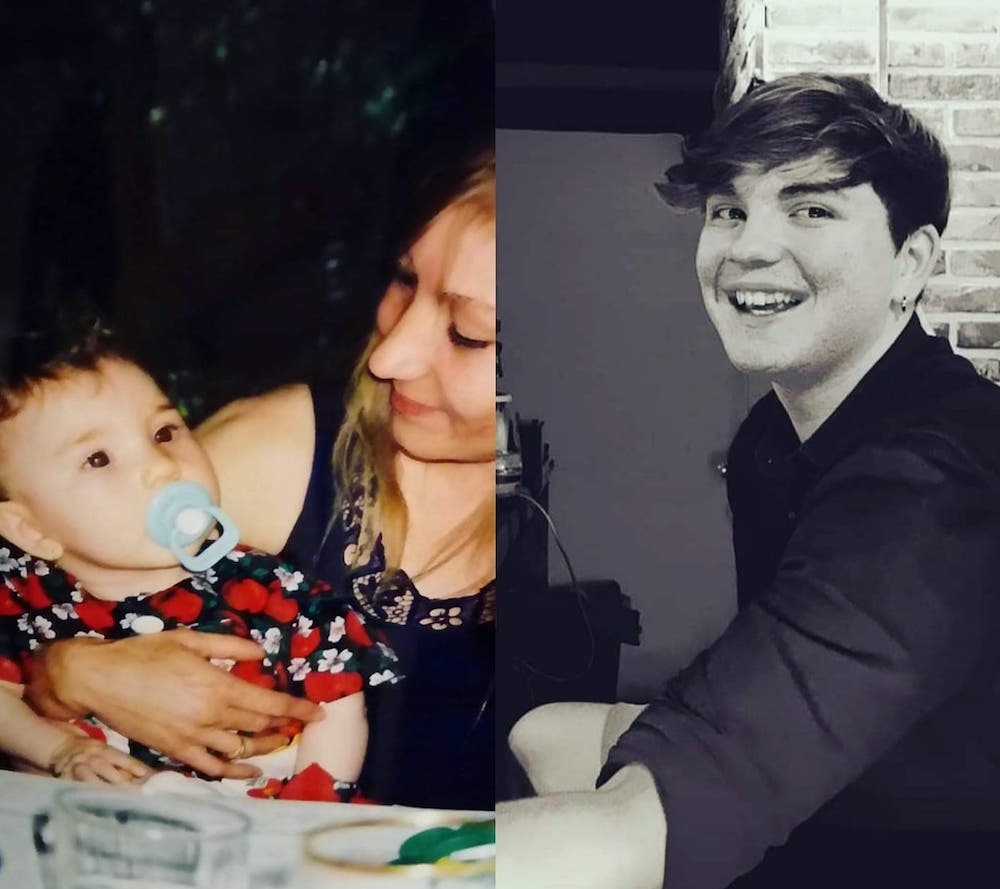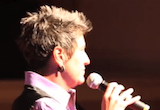Growing Up Transgender in Romania
A young man talks about transitioning in his home country and then emigrating for a fresh start. David Kai Partenie with his mother in 1997; David in 2017. (Photo courtesy of David Kai Partenie)
David Kai Partenie with his mother in 1997; David in 2017. (Photo courtesy of David Kai Partenie)
 Photo Essay
Click here to see more photos of David in Romania and South Korea.
Photo Essay
Click here to see more photos of David in Romania and South Korea.
Truthdig is proud to present this article as part of its Global Voices: Truthdig Women Reporting, a series from a network of female correspondents around the world who are dedicated to pursuing truth within their countries and elsewhere. Click here to read Maria Ruxandra Burcescu’s related coverage of LGBTQ rights in Romania.
“You don’t wake up one day and realize something isn’t right. For as long as you can remember, ‘something’ was never right. Then one day you wake up and everything makes sense.”
—David Kai Partenie
BUCHAREST, ROMANIA — I don’t remember the exact day I met David Kai Partenie, but I recall the quiet guy with a red hoodie, glasses, short dark-blond hair and a baby face. He didn’t say much, but something about him made me want to meet him. Finally, one of our mutual high school friends introduced us. At that moment, I had no idea he was transgender.
We were in an arts high school in Bucharest and the easiest way to find a subject of discussion was to take a look at his work—a series of anime sketches made with a few of his classmates. That was how we started hanging out.
When we began talking more, David told me he initially lacked the knowledge to explain why he didn’t fit into his assigned gender role. For a long while he thought there was something wrong, simply because he felt alone in this matter. He tried his best to fit in with the boys around him, even if they teased him for “being a girl.” They didn’t know how to place him socially.
David’s first transitional steps were cutting his hair short and adopting a masculine style of clothing. When he was 13 years old, he spent about a year presenting in an androgynous way, and because most of his friends were cosplayers, they were open-minded and seemed to accept it. (Cosplay is a performance art in which people wear costumes to represent characters from movies, books and anime. It is common for cosplayers to portray characters of a different gender identity.)
Slowly, female pronouns started to make less sense to David. He kept searching for a more in-depth description, a way to elucidate how he felt.
One day, he stumbled upon a video made by a cosplayer he was following on social media. The person was “coming out,” and that was the first time David heard the word “transgender” and discovered its meaning: those whose sense of personal identity and gender does not correspond with their birth sex. “I was instantly captivated,” he says. “That day I realized there wasn’t anything wrong with me.”
David then began his journey as a transgender person in Romania, a country known for its history of persecution against the LGBTQ community.
He started coming out to his friends and classmates in 2012, the second half of his freshman year of high school. Reactions were mixed, and he says, “I ended up having to cut a big chunk of people out of my life.” Because he already felt as if he were going against the whole world, he refused to keep people close to him if they refused to be supportive.
He came out to his homeroom teacher in his junior year, and she was supportive. However, our school lacked information about transgender people, and teachers didn’t really know what they could do to help. Some would address him by his surname to avoid using a masculine or feminine first name. (David preferred not to mention his birth name in this article.)
David met with Sasha Ichim, one of the main transgender rights activists in Romania, and asked for advice about coming out to his family. He later decided to tell his sister, who is a psychologist, and either his sister or his mother told his brother. David wrote a three-page letter of explanation to his mother. His father had died when David was 10 years old.
His sister had difficulty accepting David’s news. “She kept switching between male and female pronouns with me, and eventually I couldn’t handle it anymore and just told her she could either try harder to accept me as her brother or piss off and disregard me entirely,” he says. Today he is on excellent terms with his sister and his brother. David’s mother responded to his letter with a letter of her own, writing that even though she can’t consider David a son at the moment, he will always be her child and she loves him unconditionally.
Medical procedures were to be the next step, and David’s mother wanted more information about them. Sasha answered all their questions and patiently explained what they would need to do. Romanian NGOs (nongovernmental organizations) including Accept, TRANSform and MozaiQ also are available to help people who want to transition. These groups put transgender people in contact with medical specialists and introduce members of the transgender community.
In the following years, David’s mother became his greatest ally. He had his first shot of testosterone when he was 17 years old, in January 2015, followed by chest reconstruction surgery in August of that year. He chose not to get phalloplasty because he doesn’t find it worth the cost, risks and recovery time. (Sex reassignment surgery is available in Romania, but few surgeons in the underfunded medical system have the skill to perform it. The most common procedures available for transgender people are chest surgery, face feminization and hysterectomies.)
“Medically transitioning—and how far you want to go—is entirely up to you,” David says. “You may not (know it initially), but the hardest part of your journey is learning to love yourself for who you are. No amount of hormones and surgeries will do that for you, but they may alleviate your dysphoria. Do what you feel is right for you.”
Until the age of 18, David got his testosterone shots at the hospital. He says he didn’t feel welcome in the medical system—for example, a female hospital nurse asked him why he hates his parents and said he would never be a “real man.”
David’s official identification papers still recognized him as a woman. Romania has no clear guidelines for changing one’s name and gender, and few lawyers have expertise in this matter. Some people have changed their documents through the courts, but it is an expensive process that can take up to three years so David didn’t undertake it.
Although he ran into prejudice, he feels it was mitigated because he is a white, college-educated, straight, cis-passing transgender man. He says racial minorities in Romania face more serious problems, and so do many other transgender people who don’t enjoy the privileges he has.
“When one of the trans female activists in Romania came out, she lost her job, her wife and almost ended up homeless,” he says. “Furthermore, Romania has one of the highest sex trafficking rates in Europe, and a lot of those victims (forced into prostitution) are transgender women. As a transgender man, who am I to complain?” (Discrimination makes it hard for transgender women to get jobs and also makes them easy targets for sex trafficking, in which they are considered “exotic.”)
In 2016, David decided to emigrate. He had always found Korean culture interesting: In Romania, he had joined a team of traditional Korean drummers and volunteered at events organized by the Korean Embassy and by an Asian Studies center. So it was natural for him to choose South Korea for a fresh start.
That move has brought about many changes in his life. He’s no longer the quiet guy with glasses and a red hoodie, and he doesn’t love anime anymore. He’s now studying English literature, bartending and advocating for transgender rights.
One of his initial steps in Korea was to change his gender on official documents there.
“When I first registered (at the) university in Seoul, I asked the international students’ office if they could change my name and gender mark in the system, for my comfort and safety,” he says. “They agreed without hesitation and suddenly, I was in control. For the first time in 13 years of education, I got to choose whether or not I (formally) came out to my classmates. I chose to come out, so that I could bring up LGBTQ+ issues in my in-class presentations. It was the right choice for me.”
David says South Korea is a fairly conservative country, and the LGBTQ+ community there faces many of the issues that exist in Romania. He thinks people in Korea tend to “keep the peace,” while those in Romania are direct and vocal and even tend to put professionalism aside to express their points of view. He now finds much more tolerance when he deals with the public sector. In Romania, he says, he often was treated with disgust, while people in Korea are better at keeping a professional attitude.
This fresh start meant something else for David, too. To avoid negative interactions, it’s a lot easier for him to walk away from antagonistic people he has just met, as opposed to those he’s known his whole life. And in Romania, many people told him he was just going “through a phase”—something often said to LGBTQ+ teenagers. He has yet to be told that in Korea because when he emigrated, he was past 20 and five years into a medical transition.
At this stage in his journey David is much more secure emotionally than he was when he left Romania. “I feel like I’ve reached the sweet spot,” he says. “Yes, I’m trans. No, it’s not a big deal. … I’m also the happiest and the most comfortable I’ve ever been with my body. Ever.”
Your support matters…Independent journalism is under threat and overshadowed by heavily funded mainstream media.
You can help level the playing field. Become a member.
Your tax-deductible contribution keeps us digging beneath the headlines to give you thought-provoking, investigative reporting and analysis that unearths what's really happening- without compromise.
Give today to support our courageous, independent journalists.





You need to be a supporter to comment.
There are currently no responses to this article.
Be the first to respond.